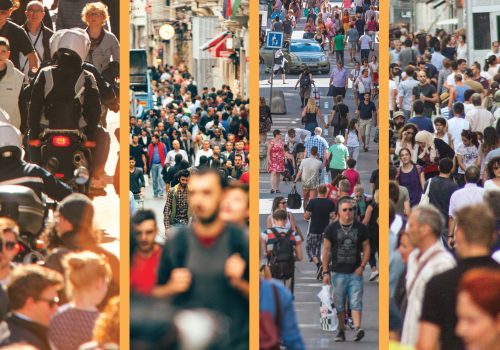Watch the full event
For people to participate fully in their government, they must first feel safe. But for women, the top impediment to participating in public life isn’t a physical threat, but one emerging online: the threat of digital violence.
That’s what Moira Whelan, director of democracy and technology at the National Democratic Institute, came away with after conducting roundtable discussions with ninety women in politics across seven countries spanning Latin America, Eastern Europe, Africa, and South and Southeast Asia.
Just 16 percent of women in politics said they received a timely and effective response to escalations of digital violence, Whelan said, underscoring the need for action while leading a panel discussion at this year’s 360/Open Summit in Brussels, hosted by the Atlantic Council’s Digital Forensic Research Lab.
She was joined by Amalia Toledo, a researcher on gender and tech issues in Latin America; Nighat Dad, executive director of the Digital Rights Foundation; Tracy Chou, CEO and founder of Block Party; and Helena Mølgaard Hansen, the deputy tech ambassador of the Office of Denmark’s Tech Ambassador. Here are some more key takeaways from the conversation.
The state of digital violence
- It is clear, wherever you are on the political spectrum, that if you are a woman in politics you will experience violence online, said Toledo, who is based in Colombia. “But it’s also clear,” she added, “that not everyone receives the same amount of violence.” Some factors that exacerbate violence include being a woman of color and challenging the status quo, such as questioning patriarchal systems in Latin America.
- “This takes place everywhere,” added Hansen, whose native Denmark launched the Tech for Democracy initiative in 2021, in response to the Biden administration’s Summit for Democracy. The goal: To make tech work for democracy, as opposed to against it, Hansen said: “We’ve seen the dark side, some might say, in how new technologies can be used against human rights.”
- “So much of platform design right now puts the entire burden on the person receiving the abuse,” Chou said, giving an example of a Reddit AMA where she would have had to individually block or report each of the “four thousand trolls” one-by-one to limit harassment. The road to a solution could include automatic data collection, so as not to re-traumatize victims, as well as helper functions that allow others to report on a victim’s behalf, she said.
Potential pitfalls online
- Western democracies must be careful when proposing strict regulations, however. “Our governments replicate those laws” and then weaponize them, said Dad, a lawyer from Pakistan, where an act ostensibly aimed at protecting women online has actually been used against women journalists, human-rights defenders, and #MeToo activists. “Pakistan or India or Nepal or Bangladesh will be like ‘Western democracies are doing it, so why can’t we?’ That’s the justification they give to us.”
- Regulation is “an important tool,” Hansen added, “but we need to do it the right way.” That means bringing in a wide array of stakeholders, from governments and civil society to private industry, which is why Denmark is using its Tech for Democracy initiative to facilitate conversations across sectors and nations. Dad, who sits on the oversight board of Meta, has seen how broader discussions can lead to change, as the board has issued 108 binding recommendations and seen 64 percent of them fully implemented so far. “This is one of the first self-regulatory models of a company that I’ve been a part of, and I think it’s a solution other companies can look to,” she said.
- Her concern speaks to one of the greatest issues in advocating for change on tech platforms, as Chou puts it: “The people who have never worked there are trying to propose things that would never make sense from inside.” A product engineer who has worked everywhere from Pinterest and Quora to Google and Facebook, Chou’s solution was to establish Block Party, a suite of anti-harassment tools to help users better control their online experience rather than rely on tech companies to enact change that wouldn’t serve their bottom line. “Safety will never be their number one priority,” Chou said.
What can be done?
- One area where regulation can help: Requiring that platforms allow more third-party tool integration. Twitter is a platform that is “very open,” Chou said, with APIs that make it easier for developers to build tools like Block Party. Other platforms, including Meta-owned platforms such as Facebook, are less open. That makes it “difficult for researchers to understand what’s happening, difficult to hold platforms to account, and almost impossible for anybody else to build solutions,” Chou said.
- Opening up platforms would also help address the issues around “a lack of prioritization” in different markets. “The platforms themselves are never going to spend as many resources in all these different countries as they do in the United States or these major markets,” Chou said. “Distributing that access across developers can enable people in different markets and different countries to build their own solutions.”
- Hansen noted how Denmark has crafted “The Copenhagen Pledge,” a “framework of Tech for Democracy” to unite governments, civil society, and technology companies in support of developing technologies that benefit democracy and human rights. With the United States, Denmark is also launching a global partnership for action on gender-based online harassment and abuse.
Watch the panel
Nick Fouriezos is an Atlanta-based writer with bylines from every US state and six continents. Follow him on Twitter @nick4iezos.
Further reading
Mon, Jun 6, 2022
What happens when toxic online behavior enters the metaverse?
Transcript By
As technology and reality intersect, policymakers are going to need to prepare for a world integrated with virtual and augmented reality.
Mon, Jun 6, 2022
Web3 is set to transform the internet. Can it bring global social and economic change?
Transcript By
The decentralized digital world is on the rise; here's what that means for political, economic, and social rights worldwide.
Wed, Jun 1, 2022
Do countries need freedom to achieve prosperity?
Report By Dan Negrea, Joseph Lemoine, Matthew Kroenig, Joel Kesselbrenner
The Freedom Index and Prosperity Index are two separate indexes that rank one hundred and seventy-four countries around the world according to their levels of freedom and prosperity.




